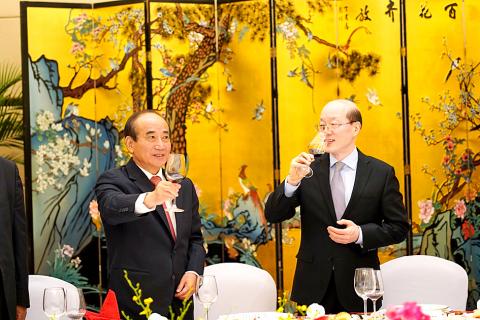The so-called “1992 consensus” has served as a strong foundation for peaceful cross-strait relations and Taiwanese independence “can never work,” Chinese Nationalist Party (KMT) Legislator Wang Jin-pyng (王金平) said in a meeting with China’s Taiwan Affairs Office Minister Liu Jieyi (劉結一) yesterday.
The two had a closed-door meeting, followed by a luncheon, at the Seaview Resort in Xiamen, China.
During the meeting, Wang addressed the minister as “Mr Liu” and said he has always believed that “Chinese people are one family sharing the same roots,” a speech transcript provided by his office showed.

Photo courtesy of Wang Jin-pyng’s office
“Taiwanese independence is a red herring and can never work,” because bloodlines and culture cannot be severed, he said.
The majority of Taiwanese, with the exception of Aborigines and new immigrants, have ancestors in China, he said.
“That we share the same bloodline is a historical fact that cannot be altered by our ethnic group, hometown, political affiliation or color,” he said.
His trip to the Wang clan’s ancestral temple in Zhangzhou on Tuesday proved that ancestral connections would remain unaffected by time and politics, he said, adding that tracing one’s cultural roots could contribute to promoting cross-strait peace.
“Over the past 20 years, the 1992 consensus has served as a strong foundation for a peaceful and stable cross-strait relationship,” he said.
“I believe from that basis, we can seek to build a new consensus and create new opportunities for building peaceful cross-strait relations,” he added.
Wang had previously described the purpose of his three-day trip to Xiamen as a visit to his ancestral temple.
Before the meeting, he was originally scheduled to visit the South Putuo Temple, but the plan was canceled early yesterday so that he could meet with Liu.
Wang was received by hundreds of supporters at Taipei International Airport (Songshan airport) when he returned to Taipei last night.
Asked why he dismissed Taiwanese independence in his meeting with Liu, Wang said he had made similar remarks at the legislature.
“My stance and view have always been consistent, that Taiwanese independence will not work,” he told reporters.
Independence is not a real issue, while pressure from China seeking unification is real and must be dealt with in a responsible, effective and cautious manner, he said.
Asked if he mentioned the Republic of China, as he had said he would if necessary, Wang said he did not, because Liu did not mention the People’s Republic of China.
The “1992 consensus” is a term former Mainland Affairs Council chairman Su Chi (蘇起) admitted making up in 2000. It refers to a tacit understanding between the KMT and the Chinese Communist Party that both sides acknowledge there is “one China,” with each side having its own interpretation of what “China” means.

Chinese spouse and influencer Guan Guan’s (關關) residency permit has been revoked for repeatedly posting pro-China videos that threaten national security, the National Immigration Agency confirmed today. Guan Guan has said many controversial statements in her videos posted to Douyin (抖音), including “the red flag will soon be painted all over Taiwan” and “Taiwan is an inseparable part of China,” and expressing hope for expedited reunification. The agency last year received multiple reports alleging that Guan Guan had advocated for armed reunification. After verifying the reports, the agency last month issued a notice requiring her to appear and explain her actions. Guan

GIVE AND TAKE: Blood demand continues to rise each year, while fewer young donors are available due to the nation’s falling birthrate, a doctor said Blood donors can redeem points earned from donations to obtain limited edition Formosan black bear travel mugs, the Kaohsiung Blood Center said yesterday, as it announced a goal of stocking 20,000 units of blood prior to the Lunar New Year. The last month of the lunar year is National Blood Donation Month, when local centers seek to stockpile blood for use during the Lunar New Year holiday. The blood demand in southern Taiwan — including Tainan and Kaohsiung, as well as Chiayi, Pingtung, Penghu and Taitung counties — is about 2,000 units per day, the center said. The donation campaign aims to boost

The Kaohsiung Tourism Bureau audited six hotels in an effort to prevent price gouging ahead of Korean band BTS’ concert tour in the city scheduled for Nov. 19, 21 and 22 this year. The bureau on Friday said that the audits — conducted in response to allegations of unfair pricing posted on social media — found no wrongdoing. These establishments included the local branches of Chateau de Chine, Hotel Nikko, My Humble House, and Grand Hai Lai, it said, adding that the Consumer Protection Commission would have penalized price gougers had the accusations been substantiated. The bureau said the Tourism Development Act

BACK TO WINTER: A strong continental cold air mass would move south on Tuesday next week, bringing colder temperatures to northern and central Taiwan A tropical depression east of the Philippines could soon be upgraded to be the first tropical storm of this year, the Central Weather Administration (CWA) said yesterday, adding that the next cold air mass is forecast to arrive on Monday next week. CWA forecaster Cheng Jie-ren (鄭傑仁) said the first tropical depression of this year is over waters east of the Philippines, about 1,867km southeast of Oluanpi (鵝鑾鼻), and could strengthen into Tropical Storm Nokaen by early today. The system is moving slowly from northwest to north, and is expected to remain east of the Philippines with little chance of affecting Taiwan,